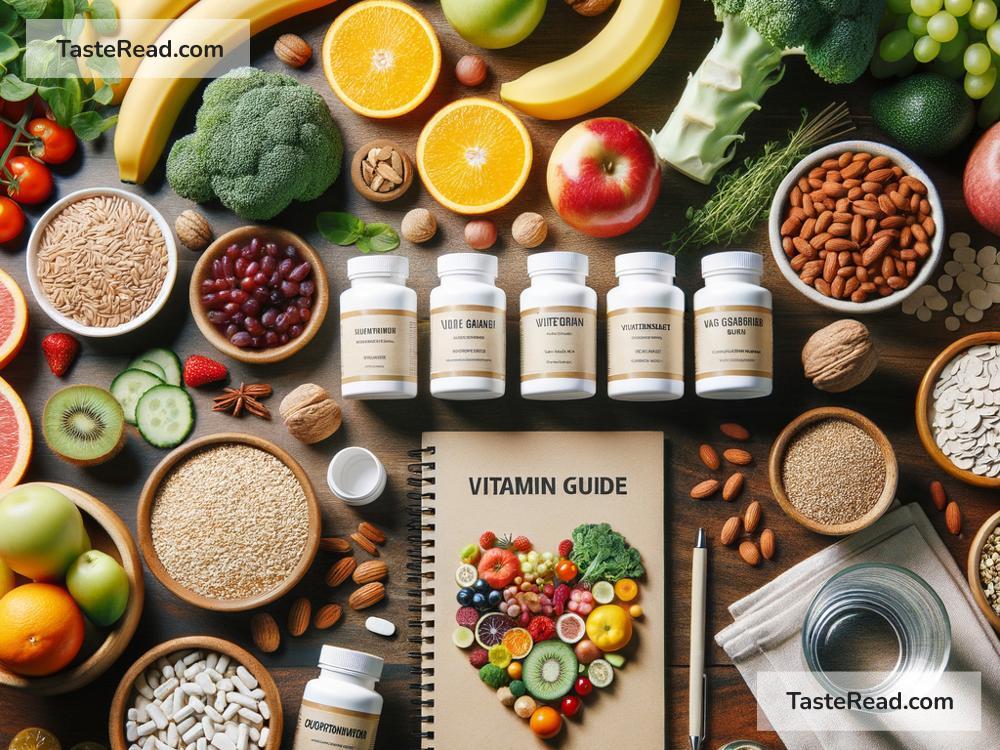Understanding the Role of Dietary Vitamins in Health
Good health doesn’t just happen; it’s built over time by giving our bodies what they need to work, grow, and stay strong. One of the key ingredients for good health is vitamins. Vitamins are small but mighty nutrients that play essential roles in keeping us well. In this article, we’ll explain what vitamins are, why they’re important, and how to make sure you’re getting enough of them, all in simple terms.
What Are Vitamins?
Vitamins are substances found in foods that our bodies need to work correctly. They’re called “micronutrients” because we need them only in small amounts, but they’re very important for things like energy production, immunity, and maintaining the health of our skin, bones, and eyes.
Unlike macronutrients like carbohydrates, proteins, and fats (which provide energy), vitamins don’t give us calories. Instead, they help our bodies perform vital functions that keep us alive and healthy.
There are 13 essential vitamins that humans need, and they can be grouped into two categories:
1. Fat-soluble vitamins: These dissolve in fat and are stored by the body. Examples include vitamin A, D, E, and K.
2. Water-soluble vitamins: These dissolve in water and usually aren’t stored in the body, meaning we need to consume them regularly. Examples include vitamin C and the B vitamins like B1 (thiamine), B6 (pyridoxine), and B12 (cobalamin).
Why Are Vitamins Important?
Each vitamin has its own job in our bodies, but they all work together to keep us healthy. Here are some examples of how vitamins contribute to different aspects of health:
1. Boosting Immunity
Vitamin C is known for supporting the immune system, which helps us fight off infections like colds and flu. Vitamin D also plays a role in immunity—making it essential to get enough when sunlight exposure is low.
2. Keeping Bones Strong
Vitamin D works with calcium to strengthen bones and teeth. Without enough vitamin D, our bones can become soft or brittle, leading to problems like rickets or osteoporosis.
3. Healing Wounds and Protecting Skin
Vitamin K helps our blood clot, which is necessary for wound healing. Vitamins like A and E are also important for maintaining healthy skin and protecting it from damage.
4. Supporting Energy Levels
B vitamins, like B1, B6, and B12, help our bodies turn food into energy. Without them, we might feel tired, sluggish, or weak.
5. Promoting Eye Health
Vitamin A plays a key role in keeping our vision sharp and protecting us from conditions like night blindness.
6. Helping Cellular Repair
Vitamin E acts as an antioxidant, which means it helps protect our cells from damage caused by harmful molecules called free radicals.
As you can see, vitamins are involved in everything from healing wounds to boosting energy. Without them, many of our body’s processes would slow down or stop.
Where Do Vitamins Come From?
We get most of our vitamins from the foods we eat. Fruits, vegetables, whole grains, dairy, meats, nuts, and seeds all contain vitamins, which is why eating a balanced diet is so important.
Here are some examples of foods rich in vitamins:
– Vitamin A: Carrots, sweet potatoes, spinach, and eggs
– Vitamin B: Whole grains, beans, meat, and nuts
– Vitamin C: Citrus fruits (like oranges and lemons), strawberries, and bell peppers
– Vitamin D: Fatty fish, fortified milk, and sunlight (our skin can produce vitamin D when exposed to the sun)
– Vitamin E: Nuts, seeds, and vegetable oils
– Vitamin K: Leafy greens like kale and broccoli
Can You Have Too Many Vitamins?
While vitamins are essential for health, too much of a good thing can cause problems. This is especially true for fat-soluble vitamins (A, D, E, and K), which the body stores and can build up to harmful levels.
For example, taking very high doses of vitamin A over time can lead to symptoms like nausea, dizziness, and even liver damage. Similarly, too much vitamin D can lead to calcium buildup in the blood, which can damage the kidneys and heart.
Water-soluble vitamins are less likely to cause problems because excess amounts are flushed out in our urine. Still, it’s better to get the right amount rather than too much.
How to Get Enough Vitamins
To make sure you’re getting the vitamins your body needs:
– Eat a variety of foods: Aim for colorful fruits and vegetables, lean proteins, healthy fats, and whole grains in your meals.
– Check portion sizes: Some vitamins are found in small quantities, so eating enough of different food groups will help.
– Consider fortified foods: Some foods like cereals and milk are fortified with vitamins to help people meet their nutritional needs.
– Take supplements only if needed: Talk to your doctor before starting a multivitamin or supplement. These can be helpful if you’re deficient, but they’re not a replacement for a healthy diet.
Conclusion
Vitamins may be small, but they have a big role in keeping us healthy. They help with everything from energy production to immunity, bone strength, and eye health. By eating a balanced diet filled with nutritious foods, we can give our bodies the vitamins they need to function at their best. Remember, getting vitamins naturally from food is the best way to stay healthy—and supplements should only be used when necessary. Take care of your body, and it will take care of you!


